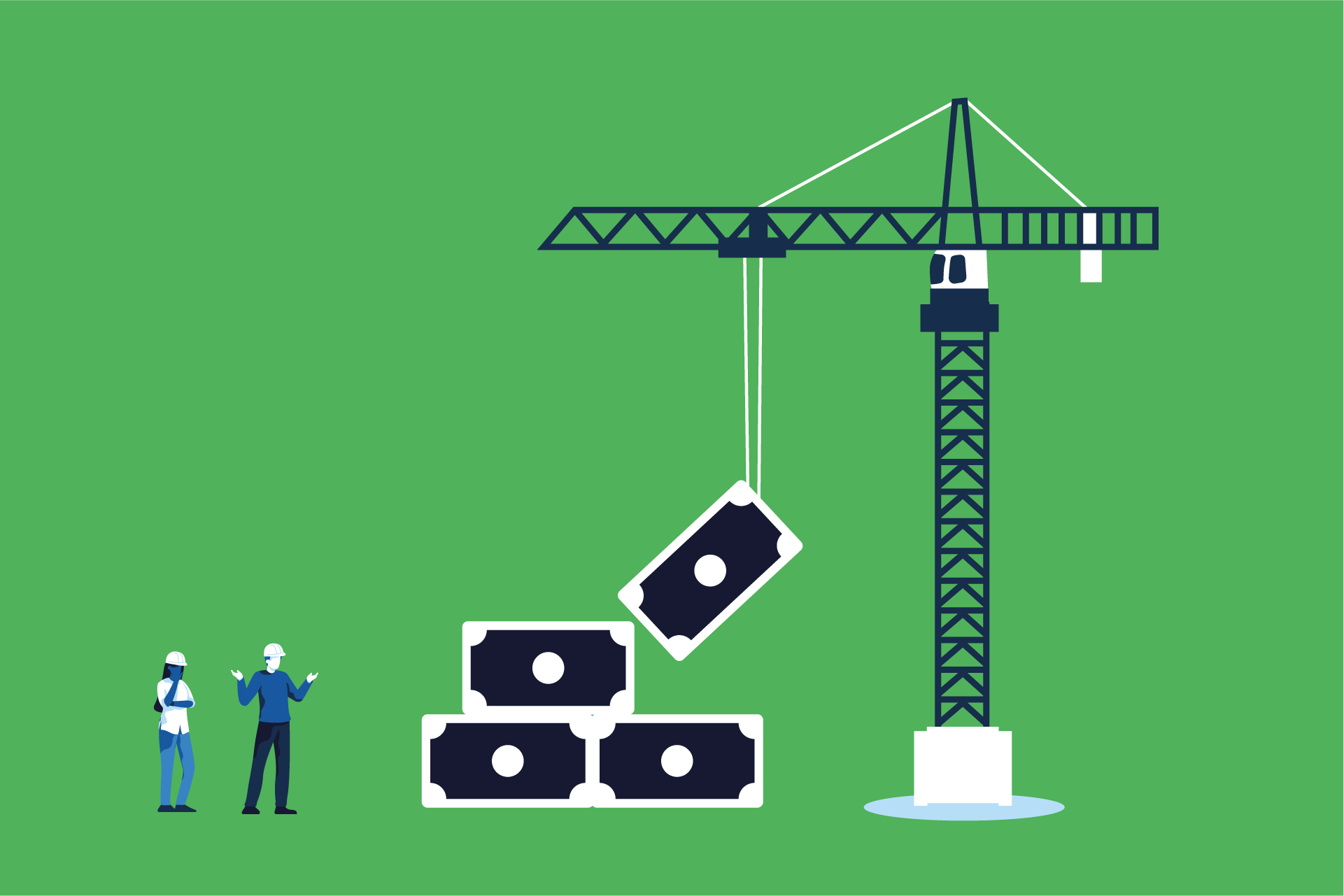Our goal at Lending Valley is to provide all small business owners access to the best loans possible for their business. You can rest assured we will get you the best rates in the market!

There are multiple ways you can get a construction business loan, depending on how much you need, how quickly you need it and why you need it.
I am going to breakdown everything you need to know about construction business loans and how you can get the working capital you need for your construction business.
Getting the money together for a construction business is pretty difficult. Why? Well, as we are sure you know, you do not get paid until you finish your projects, yet you need to purchase materials, equipment and supplies and your employees want a regular salary. You have a lot to fund. This is where construction business loans come in — to provide you with cash for your construction company when you need it most.
Initially, contractors, like yourself, will think about acquiring a business loan, however, do not be pushed into thinking that this is your one and only option — it isn’t! You have many types to choose from, some of which we will delve into here today.

We have a variety of loan products available for contractors as we know each business is different. You can pick and choose the type of construction business loan that appeal most to you and let us know when you are filling out the application.
Small businesses, regardless of whether they are in the construction industry or not, will go for this one first usually.
These are construction business loans guaranteed to be offered by the United States government thanks to the Small Business Administration. They are very similar to commercial loans (which we will discuss after this one) but, commonly, they come with better interest rates. Why is this? Well, it is because they are backed by the government.
There are two major types of SBA loans.
The SBA 7(a) loan is for working capital, supply purchasing, operational expenses, equipment, property or refinancing any debt.
The CDC/504 loan is for buying landing, renovating a property or buying big-ticket equipment or machinery items that are for long term use.
Both of these take as long as 90 days for approval to be granted and, of course, you will have to meet some requirements (scroll to the ‘Requirements for Construction Business Loans’ section to find out exactly what).
There are definite advantages to taking out an SBA loan such as:
Of course, like with everything in the world, advantages come with disadvantages! For SBA loans, these include:
You have an additional disadvantage if you use a lender that isn’t preferred by the Small Business Association since there is another approval step. This simply slows down the whole process.
These types of construction business loans give you one big lump of cash that you could be paying back for the next 1 to 25 years. Though they can be used for working capital, you are usually best off to utilize them for any fixed assets.
You will repay the loan every month in installments which include the interest and principal on top already. Occasionally, you are able to acquire a balloon loan which is where you are required to pay smaller chunks for a bigger sum. This is one of the best business loans for contractors since you don’t typically see the big bucks until you have finished a project.
Typically, the approval times for commercial loans are shorter than our previously discussed SBA loans but interest rates and other fees could possibly be pricier.
Many advantages come with obtaining a commercial loan, like:
As we have said before, where there are advantages, disadvantages are not far behind. For commercial loans, these are:
Equipment financing, as the name suggests, is a construction business loan that can be used only for buying assets and equipment that are to be used within your business.
For your construction business, this could relate to cement mixers, drills, diggers and anything else that you could possibly need!
The collateral is the equipment that you purchase with the loan so you will not need to place any collateral down at the beginning. Then, if you can’t pay back the loan or your business falls through, it is the equipment itself that repays the remaining balance.
Equipment financing for contractors come with a range of benefits that are especially attractive to construction businesses. The advantages include:
After you have finished paying back the loan, you will outright own all of your equipment. This is useful for items that have longevity.
Since the equipment you will be buying with the loan is 100% for your business, you will be exempt from some tax!
Putting a big sum of money down upfront for a huge purchase will undoubtedly hurt your cash flow. However, with this business loan for contractors, you can spread the cost over however many months to prevent this damage.
As we have already said, the equipment you buy is your collateral so it is not necessary to stick a load of pre-existing assets on the line and risk losing everything.
Depending on the lender you choose, your funds can be released really quickly — some even on the same day that you apply!
If you have a good relationship with your lender, you should be easily able to nab a payment schedule that suits you. Whether it is monthly, quarterly or annually, you just need to ask for it.
The disadvantages include:
Even though this factor was on the list of advantages, it belongs on the list of disadvantages too.
Completely owning your equipment will mean that you incur the full maintenance costs, as well as fees that come if/when your machinery breaks.
Since you can only use this type of construction business loan for buying equipment, you will not be able to use it should issues occur with hiring, rent or other fees.
Thanks to the interest that is added to your total sum of borrowed money, you will end up paying more than if you buy your items with your own money. People do not tend to have this kind of money stashed away though, which is why equipment financing exists in the first place.
If anything goes wrong with the equipment you buy, you are responsible for it and any costs that come with fixing it.
A business line of credit is a construction business loan that works like a credit card. You have a cap on the amount you can take out; plus, you take out exactly what you need, as and when you need it, paying back the amount you borrow and nothing else. This way, you can borrow multiple times for as long as the line of credit exits.
This type of loan has low-interest rates when compared with credit cards and traditional bank loans for businesses. Amazingly, the closing costs are lower too! But if you miss a payment, are late paying it back or you take out more than you have agreed, your interest rates will heighten.
Businesses use this type for operating expenses like paying their employees or buying supplies. It is great for a contractor, like yourself, since you know you will receive a big payout from your clients once you have completed the project.
Bear in mind that you should authorise a line of credit before you actually need it because a good-looking cash flow will increase your chances of being approved.
If you can be approved for a line of credit, you will benefit from from the same buying capabilities as a credit card, plus, you will be required to pay less interest over the course of the loan.
For you as a business, having a credit card can cause you to buy unnecessary items since you can obtain tax advantages. However, with a line of credit, it is linked to your business bank account so it will reduce your urge to spend.
You can have your money within a day of you applying for a line of credit. Whereas, a credit card or other type of loan can take a while to process.
Much like a credit card, you can use a line of credit as and when you need to. Plus, if the loan defaults then you will not lose your assets — it is just your credit score that will be harmed for up to 10 years if something goes wrong.
Since you only draw from the loan when you actually need it and you only borrow the exact amount you need at the time, it offers great flexibility.
However, just remember that you will probably have to prove that the money you draw will be used for business purposes.
The first structure is called the ‘draw’ option. Much like a credit card, as long as you pay back the amount you have borrowed, you won’t need to pay it every month which is a real win-win.
The second structure is called ‘demand’. You can take money out like the above method, but your lender could order full repayment whenever they like.
The third structure is called ‘balloon’. With this one, smaller monthly payments are guaranteed but you have to pay a large lump sum when the term finishes.
Being allowed to take out 100 per cent of your limit amount makes life easier when it comes big purchases. Plus, you have a payment schedule that you have agreed upon beforehand so you can budget effectively.
You will need to research for a huge amount of time before you find a deal that you like. Plus, since you will probably have to apply to many different lenders, your business’s credit score will be impacted.
Line of credit loans aren’t under the same regulations as things like credit cards are so it’s important to check all the costs, fees and terms before you take one out.
Again, this just adds more time to your search for the best deal.
The majority of line of credit loans come with a variable interest rate so the lender is under no obligation to keep your rate the same throughout your term.
If you are usually maxing out your credit cards, you probably don’t want to take out this type of business loan for contractors since you will most likely max this out too.
When you take out a line of credit loan for your business, you have to apply for a minimum. This is usually set at $1,000 but can be as low as $500 but it will come with a higher interest rate.
As soon as you access your money, the interest build until you repay the withdrawal amount so you will pay a lot more for any purchase you make.
The majority of lenders need you to have a score of 690 or more, a few may even need you to have a score of 750 or above!
Plus, your credit history has to be pretty good over the past 6 years. Not to mention that you will be required to prove you have had an income and employment.
This is basically where you take a constriction business loan from a financial institution that is not a bank. Generally, they are smaller than traditional loans and come with shorter terms (1 month to 5 years).
However, interest rates and costs associated with your new loan are higher.
The application process is usually very quick and easy to follow. You will usually just need to enter skin-level business information and some basic financial figures.
You can have your hands on the money within a day so your business can grow straight away!
Since these institutions are not banks, they don’t require you to have a good credit score (nor any credit history at all).
Most traditional loans make you spend the money on exactly what you have said you will so it can be restrictive. However, alternate lending lets you spend it on whatever you need at the time.
If you have a lender that is right for you, then your relationship with them can continue for ages. With this as the case, you can probably lower interest rates as time goes by.
Your interest rates with alternate lending will usually be higher than if you worked with a traditional bank loan.
Non-bank financial institutions are pretty new, thus there is a chance that your lender can go bust. This will negatively impact your business should this happen to you.
If you get lucky with your profits and you can pay the full loan off after a shorter amount of time, you might not get any early payment discounts.
Remember to read the small print since non-bank lenders could hide some pricey fees in there somewhere.
Technically, this is not a loan. It is simply a contract that states you will sell part of your future earnings. With this option, you can be provided with amounts from $5,000 to $250,000 (1/3 of your annual revenue).
You are allowed far more time to repay the loan which makes your monthly payments less complicated to handle.
You can access high amounts of money for bigger purchases that you, as a contractor, will probably need.
You won’t be required to give over any control of your company so you maintain all of the ownership which is much more attractive for most business owners.
Revenue-based financing has the biggest capital cost in the entire loan industry. So, this one might not be for you.
Even if you can afford to pay your debt off early, you have no incentive to do so.
Most lenders state they can offer funding within 30 days but, bear in mind, this is pretty slow in this industry.

Each type of construction business loan will have different requirements so it is hard to state for sure which you will need to meet by. However, generally you will need to:
For pretty much all the construction business loans we have mentioned here, you can apply online and then, for commercial loans, you will need to make an appointment to go and present your proposal to the loan officers.
However, you can call us and do it that way but, it is much less time consuming to do it online.
Lending Valley offers the best terms possible to contractors which will definitely be very attractive to you as a construction business owner.
The kind of terms they provide include:
If you are setting up a construction business or you are already up and running but need new machinery or materials, then a construction business loan is definitely the